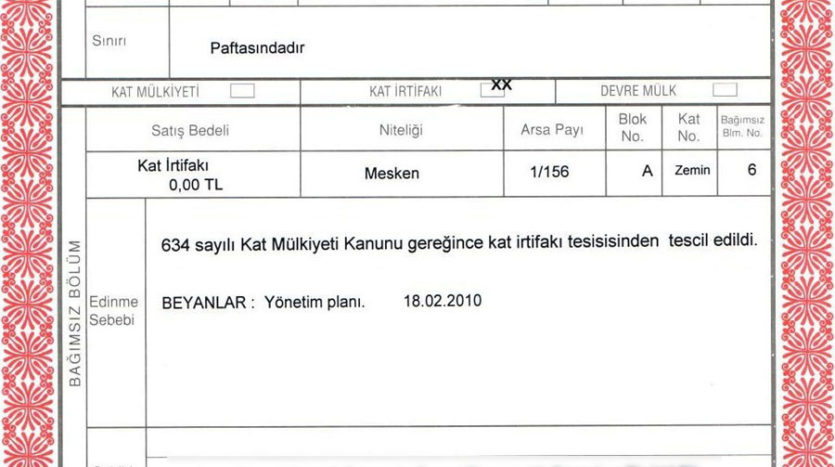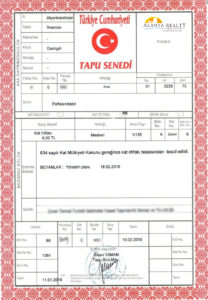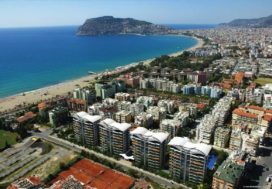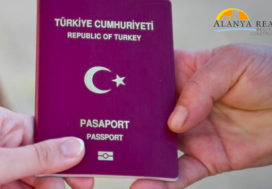TAPU (ownership) in Turkey
If you plan to buy an apartment in Turkey, we advise you to read this article.
This is a detailed guide for you to fully understand what Tapu (Property Certificate) is in Turkey.
If you are planning to buy property in Turkey, TAPU should be the first Turkish word that you should know and understand.
TAPU (short for TAPU SENEDİ) is the Turkish translation of the “certificate of ownership” and the only document showing that you have acquired full ownership of your property purchased in Turkey.
The equation is simple: no TAPU, no property!
No matter what you say you do, you will not be considered the rightful owner of your property.
That is why I must understand what to look for and, naturally, what to understand from it!
So, let’s figure it out step by step:

What does TAPU look like?
As you can see from the pictures below, TAPU is a piece of paper on which all information about your property is recorded. Let’s start with a simple translation:
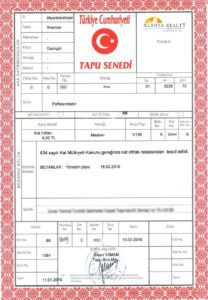
Let’s take a look step by step:
1 – OR / PROVINCE:
If you are in Istanbul, then “Istanbul” should be written, if you are in Antalya, “Antalya” should be written. Name of the province (For your information, there are 81 provinces in Turkey)
2 – ILSHESI / CITY IN AREA:
You must be written “Alania.” For example, if you are in Beylikduzu.
3 – MAHALLESİ / DISTRICT:
The area in which the property is located. Despite the fact that this is an important part, TAPU, do not worry if it is empty.
4 – KÖYÜ / VILLAGE:
A pointer to the exact location of the property. Following the above example, if you are buying property in Istanbul, the name of the village may be Merkez (center). Or, if you are buying property in Antalya, Alanya, the name of the village may be Mahmutlar.
5 – SOKAI / STREET:
The name speaks for itself. This is also one part in TAPU that may be empty. No panic, this is normal.
6 – MEVKİİ / LOCATION:
Depending on where you buy.
7 – PAFTA number / card number:
This is another important part of TAPU, as well as No. 8 and 9 below. This is the code name for the city planning card on which your property is located.
8 – ADA / BLOCK No.
The number of the block in which your property is located.
9 – PARSEL No. / SITE No.:
This is the last detail about the location of the object on the city map.
10 – NİTELİĞİ / FEATURE:
In our case, to the building block and the land on which the building was built.
11 – PHOTO / IMAGE:
Passport size of the image of the owner (s) of the property.
12 – YÜZÖLÇÜMÜ / SIZE:
Details of the land described below from No. 13 to 15.
13 ha / ha:
1 ha = 10,000 m2 or approximately 2,471 acres
14 – m2 / square meter:
1 m2 = 10.7 square feet
15 – dm2 / square decimeter:
1 dm2 = 0.01 m2
16 – SINIRI / BORDERS:
Confirmation that the building (or complex) was correctly constructed within the permitted boundaries.
17 – KAT MULKİYETİ / CONDOMINIUM:
If this check box is selected, this means that construction must be completed, and all necessary permissions from local authorities are allowed for living and living in complexes.
TAPU finished units should be delivered with a tick.
18 – CAT IRTIFACCI / CONSTRUCTION MAINTENANCE:
This means that the developer can create an independent unit of the complex and have released a separate TAPU for each of them. This means that you have the full owner of an independent unit.
Many of those who have already released TAPU have this flag instead of CONDOMİNİUM, as described above. Do you have to worry? The answer is a bit complicated and includes YES and NO at the same time:
NO, you do not have to worry about how you own real estate. You have received full ownership of your property and legally confirmed this fact.
YES, you should be “a little” worried, as this also means that the construction company has not yet received full permission from the local authorities. Some owners cannot go through tax and group operations.
Even if this box is checked?
YES, most completed projects deliver TAPUs with the checkbox selected.
19 – DEVRE MÜLK / TEMPORARY DIVISION (Property):
This means that you bought yourself an apartment with a temporary separation. If this is a problem, then problems may arise. Temporary separation is based on the principles of the sale of ownership shares to many buyers.
20 – SATIŞ BEDELİ / SALE PRICE:
The price paid to purchase this particular property.
21 – NİTELİĞİ / FEATURES:
TAPU (for this there is an apartment, land, etc.)
22 – ARSA PAYE / DIVISION OF THE EARTH:
Property for sale in Turkey on which the property was built. What you have on earth.
23 – BLOCK No. / BLOCK No.:
If you purchased property in a complex with more than one block, the block number will be written here.
24 – No. CAT / FLOOR:
Mentioning the floor on which your apartment is located.
25 – BAYMSIZ BLM № / DOOR №:
Mention your door number.
26 – BAĞIMSIZ BÖLÜM / INDEPENDENT SECTION:
Specific details about the property itself
27 – EDINME SEBEY / REASON FOR PURCHASE:
A brief explanation of why this TAPU was released. This is one of the most important parts.
TAPU, where your name will be written for the first time.
You will read a sentence similar to:
While previously registered (NAME OF THE NEW OWNER).
28 – SAHIBI / OWNER:
If you have obtained legal title to real estate.
Below is information about what can be found in this book, on the page, etc.
Now that we’ve clarified TAPU in detail, let’s move on to the most frequently asked questions and questions.
1 – Who can apply for a TAPU?
TAPU can be issued only at the local registration office of the Earth and the Cadastre. On time and on the day of delivery of TAPU, the seller and the buyer meet at the local office of the land plots and sign the delivery documents under the supervision of a civil servant. Subscription at your local land register and cadastre office.
2 – When should I get my TAPU?
It is assumed that TAPU will be delivered after full payment for the purchase of real estate. Although TAPU can be delivered until full payment. If accepted by the Seller, the Buyer may receive TAPU until full payment to Tapu.
3 – What is a security clause?
The seller agrees to deliver the TAPU without receiving full payment for the property that he / she must be entitled (and will never pay) to place an item on the TAPU for the amount that the buyer must pay in order to ensure full payment. All others must pay 20,000 lire – he / she will put in a clause stating that the amount should be increased until a later time. The seller has the right to immediately request the sale of property. Naturally, this does not mean that





